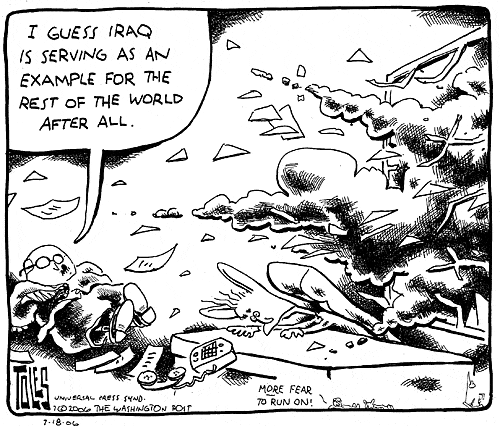Thursday, July 20, 2006
Boston Globe: Price tag to rebuild Iraq rises by $50b

Price tag to rebuild Iraq rises by $50b
Auditor says US to pay most of tab
WASHINGTON -- The new Iraqi government will need about $50 billion in additional aid to rebuild the country's oil facilities and electrical grids to prewar levels, the US government's top auditor told Congress yesterday. And he warned that the United States is likely to have to pay the vast majority of it.
The funds would be on top of the roughly $30 billion that the United States has already committed to rebuild the war-torn country since the March 2003 invasion -- most of which has been spent. The estimate is also in addition to the steadily rising cost of the American military deployment in Iraq, which has topped $300 billion, according to the latest government figures.
The estimate is the first full accounting of Iraqi reconstruction needs by US Comptroller General David M. Walker , the nation's top fiscal watchdog.
The Bush administration has not offered any recent estimates of Iraqi reconstruction expenses and had given no indication that costs could grow so significantly. The administration's last request for rebuilding dollars, approved in early June, was for $1.5 billion.
Before the war, administration officials said oil revenues would be sufficient for the Iraqi government to pay for the country's reconstruction. But later in 2003, the administration asked Congress for $18.6 billion in reconstruction money, most of it for Iraq, and has since received smaller installments from Congress. The administration has also funneled billions of dollars from the Defense and State departments' regular budgets to Iraqi reconstruction, according to the Congressional Research Service.
Nonetheless, ``additional funds will be needed to finance remaining reconstruction needs and to restore, sustain, and protect the infrastructure that has been built to date," Walker told the House Government Reform Committee. ``Iraqi needs are greater than originally anticipated."
In addition to the $50 billion for oil and electricity needs, he said, the Iraqi government is likely to need additional resources to meet other basics and to support the fledgling security forces .
Walker testified about the rising cost of the Iraq war and the war on terrorism. He appeared along with top Bush administration budget officials, who faced tough questions from Republicans and Democrats about the estimated $430 billion that has been spent on military operations and diplomatic efforts overseas since the Sept. 11, 2001, terrorist attacks.
Walker, who also runs the Government Accountability Office, said that while military costs -- currently about $1.5 billion a week -- are rising sharply, the US government is likely to have to foot almost all of the bill for the Iraqi government's future rebuilding needs as well.
According to GAO figures, the United States has already allocated about $10.5 billion since 2003 for restoring essential services in Iraq.
But key projects have yet to be completed because of security problems, management lapses, and corruption.
Citing figures compiled by the Department of Energy's Energy Information Administration, Walker estimated that at least $30 billion more will be needed to ``reach and sustain oil capacity of 5 million barrels per day." To sustain the necessary electricity output, ``they will need $20 billion through 2010," he reported, citing US government and industry specialists.
A variety of factors make Iraq unable to support its own infrastructure , according to Walker, even beyond the damaged state of its oil industry. ``Iraqi budget constraints and limited government managerial capacity limits its ability to contribute to future rebuilding efforts," he reported.
Rampant corruption in Iraqi government ministries is also partially to blame, according to a 19-page assessment Walker provided on the war costs to date.
``Reconstruction efforts have not taken the risk of corruption into account when assessing the costs of achieving US objectives in Iraq," the report said.
``The International Monetary Fund, the World Bank, Japan, and the European Union officials cite corruption in the oil sector as a special problem. In addition, According to [State Department] officials and reporting documents, about 10 percent of refined fuels are diverted to the black market, and about 30 percent of imported fuels are smuggled out of Iraq and sold for profit."
The government will need ``significant help" in building the accountability systems to prevent corruption , Walker said.
Bryan Bender can be reached at bender@globe.com. ![]()